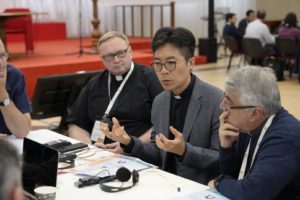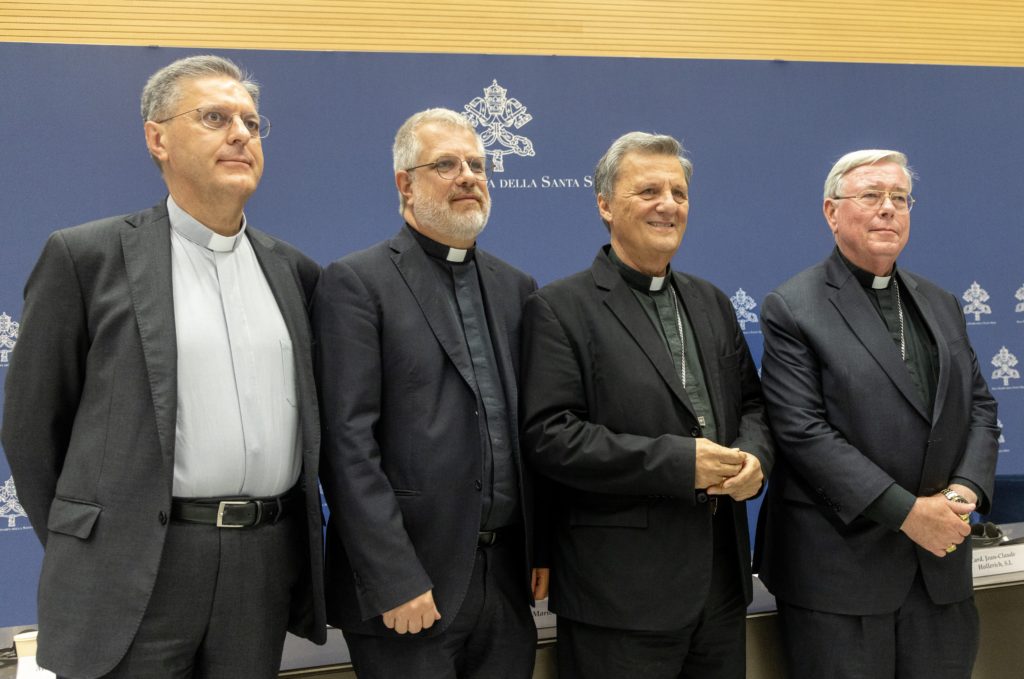ROME — Officially, October’s monthlong gathering of the Synod of Bishops on Synodality in Rome is set to bring a multiyear discussion on the topic to a close. But the process could be a disappointment for those hoping for a climax featuring some of the hot-button talking points raised in initial stages.
Speaking at a Sept. 16 press briefing, lead synod organizer Cardinal Mario Grech said topics discussed last year, such as the women’s diaconate, priestly celibacy, and outreach of Catholics who identify as “LGBT” will not be part of next month’s discussion.
“What sense is there in repeating the same experience as last October?” he said, saying last year’s assembly “was already heard, otherwise we would go on eternally.”
Those issues, while prominent in the Instrumentum laboris, or official working document, for last year’s synod discussion, were notoriously absent from the document for this year’s synod, which will run Oct. 2-27.
Instead, Pope Francis has asked that those and other issues be evaluated by 10 different study groups dedicated to various topics from a “missionary synodal perspective,” including the relationship between the Eastern Catholic Churches and the Latin Church; “Theological criteria and synodal methodologies” for shared discernment of controversial issues; what the Church’s mission looks like in the Digital Age; and the revision of documents pertaining to priestly formation and the role of bishops.
A study group dedicated to “specific ministerial forms” will evaluate specific forms of ministry for women and is being spearheaded by the Vatican’s Dicastery for the Doctrine of the Faith.
During the press briefing Grech insisted that “the topic of his synod is how to be a Church in mission,” and it will thus not focus on any specific issue, nor will it likely yield any concrete decisions on primary topics of interest.

The study groups, formed earlier this year, will present their initial findings to the synodal assembly on Oct. 2, the first day of the synod, but the topics are not expected to be major talking points throughout the monthlong gathering.
Rather, Grech and other synod organizers have repeated throughout the process that the idea is to be a “listening Church” that welcomes everyone, and that the synod process, rather than seeking consensus on individual discussion items, is about learning how to journey together while ensuring that everyone has space and is heard.
With this approach, the synod, Grech said, will “give more space for the Church to go forward.”
Differently from last year, the synod discussion this year will feature four public “theological-pastoral forums” on certain topics, and a penitential liturgy will also be held prior to the synod’s official launch to ask for reparation for various sins.
The Oct. 1 liturgy will be held in St. Peter’s Basilica and will feature three testimonies — a victim of the “sin of war,” the “sin of abuse,” and of “the sin of indifference to the drama present in the growing phenomenon of migrations all over the world.”
Subsequently, a vocal confession of several other sins will take place, including sins against peace, creation, women, and poverty, as well as the sins of “using doctrine as stones to be hurled” and sins “against synodality / lack of listening, communion, and participation of all.”
Francis will then address “on behalf of all of the faithful” a request for forgiveness to God and to “the sisters and brothers of all humanity.”
The four “theological-pastoral forums” will take place on two separate nights.
Two of them, dedicated to the topics, “People of God as Subject of the Mission” and “The Role and Authority of the Bishop in a Synodal Church,” will be held on Oct. 9 in the Jesuit Curia Hall and the Patristic Institute Augustinianum, respectively.
An additional two forums will be held Oct. 13 exploring the topics of “The Mutual Relationship Local Church-Universal Church” and “The Exercise of the Primacy and the Synod of Bishops.”
These forums will be the only events open to the public throughout the month that the synod will be in session, and one of the few open to the press.
According to a Vatican press release, while the names of the speakers have not yet been announced, the events “will address, from different perspectives, various aspects” of the four themes selected for discussion, which the Vatican said are “of particular relevance for understanding the Church’s missionary, synodal life.”
Each of the forum discussions will feature two theologians, a woman and a man, as well as a woman or man expert in canon law, and a bishop.
Just as last year, there will also be two bishops from mainland China who will attend the synod, though organizers said they were unaware how long the bishops would stay, or whether they would leave part way through, as was the case during last October’s discussion.
The synod will close with the canonization of several saints on Oct. 20, and presumably, the final concluding document that will be voted on and presented to Francis will eventually be used for a papal magisterial text on the synod that will be published several months later.
However, those expecting a major shakeup or a decision on one of the hot-button issues that have come up in the discussion thus far, if the documents issued so far are any indication, will likely be disappointed.
In that sense, it’s likely that this year’s synod — which brings three years of consultation at the local, national, continental, and global levels to a close — will end with more of a whimper than a bark.

